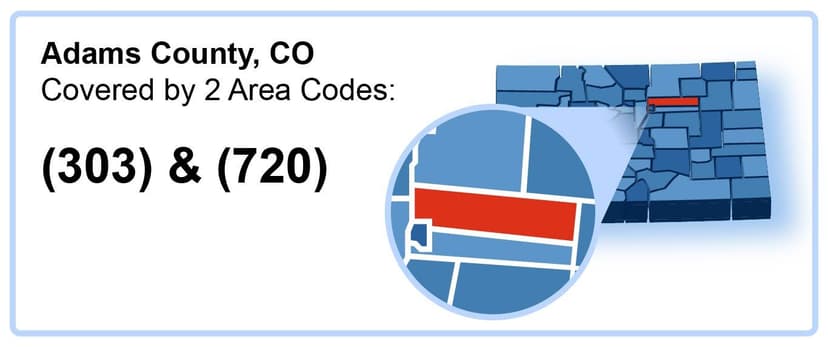What are Adams County Area Codes?

As the number of phone users in the country grew rapidly, the North American Numbering Plan (NANP) was launched to ease the difficulty in routing long-distance telephone calls. The NANP achieved this by segmenting the entire country into different telephone service areas known as Numbering Plan Areas (NPAs). Distinct area codes were assigned to each of these NPAs and the 10-digit telephone numbers registered in an NPA have the area code preceding them. Each state had the Federal Communications Commission (FCC)’s mandate to supervise the area codes’ administration in their territory. In Colorado, the Public Utilities Commission (PUC) oversees the state’s area codes.
Presently, two area codes serve Adams County and they are:
Area Code 303
Introduced as one of the original 86 area codes in 1947, area code 303 formerly served Colorado’s entire territory. Currently, it only serves Adams County and some other counties in north-central Colorado. The 303 NPA covers Adams County communities like Brighton, Thornton, Arvada, Westminster, and Commerce City.
Area Code 720
Area code 720 is a Colorado telephone overlay code that was activated in 1998 as an overlay on the 303 NPA.
What are the Best Cell Phone Plans in Adams County?
Verizon provides the widest cellular phone coverage in Colorado with a network extending to 82% of the state. AT&T’s 80% coverage is a close second while T-Mobile’s wireless signals reach 64% of Colorado’s territory. Sprint offers only 40% coverage but it has roaming agreements to use other operators’ networks in places where its network falters.
Wireless and VoIP telephone services have pushed traditional landlines aside as the primary means of accessing telecommunications services. A 2018 survey by the CDC reported that 61.4% of Colorado adults used wireless-only telephony services in their homes. Adults in households that exclusively used landlines stood at 3%. Only 0.6% of minors in Colorado resided in households that were landline-only while about 67.9% of them lived in homes that used wireless-only telephony services.
Voice over Internet Protocol (VoIP) also played a massive part in the decline in landline usage. Routing phone calls over the internet allows providers to offer subscribers many value-added features that incur extra fees with landline and cellular phone services. A Report from the FCC suggests active VoIP subscriptions have now surpassed the number of landline users.
What are Adams County Phone Scams?
These are phone scams conducted using telephony services and targeted at Adams County residents with the aim to fraudulently obtain funds and personal information. Using telephone calls and text messages, fraudsters deceive targets into parting with their money and sensitive data. One way the Colorado Attorney General’s Office tries to curb phone scams is the Stop Fraud Colorado initiative. The aim is to inform Coloradans about the different phone scams prevalent in the state and how to avoid them. Some of the identified cons include:
What are Family Emergency Scams?
These scams are also called grandparent scams because they mostly target elderly residents. Family emergency scams are perpetrated when con artists contact their marks, claim to be their grandchildren, and seek urgent financial assistance to resolve emergencies. Usually, the fraudsters have carried out some background research, mostly from social media, on the targeted residents, to lend some credibility to their pitches. With the information on hand, they successfully impersonate their victims’ grandchildren and convince them to send money to resolve their fictitious issues.
Authorities advise Coloradans to have a secret family password to verify the identities of callers claiming to be relatives. Reaching other family members to confirm the relative’s actual status before sending funds is also advised. Residents who are victims of family imposter scams should report these incidents to the Attorney General’s Office by filling and submitting the complaint form.
What are IRS Tax Scams?
Fraudsters perpetrate IRS tax scams by impersonating Internal Revenue Service (IRS) officials and making phone calls to residents to ask for outstanding tax debts. These phone calls are usually aggressive, with the scammers threatening severe punishments if the targets do not make immediate payments. Threats include revocation of drivers’ licenses, seizure of properties, deportations, and arrests.
IRS tax scams can also target residents’ confidential records. In these cases, the callers inform their marks that they are eligible for tax returns, but they will need their financial and identity details for verification purposes. Unwary residents fall for this and divulge information like bank details, Social Security Numbers, and credit card details. Authorities warn that the IRS does not contact defaulters to seek immediate payment over the phone. The IRS is required by law to give residents the chance to challenge the amount they have been charged. To report IRS tax scams to the Attorney General’s Office, dial (720) 508-6000 or file an online complaint.
What are Jury Duty Scams?
Jury duty scams involve threatening targets with arrest for missed jury duty to get them to make immediate payments or reveal financial information. Scammers assume the roles of court officials, local police officers, or employees of the District Attorney’s Office to perpetrate these scams. After introducing themselves as one of these government agents, they inform marks that arrest warrants were issued against them for missing jury duty and other court appearances. The scammers ask the targets to pay fines to clear the warrants issued in their names or risk immediate arrest.
Residents who dispute receiving any summons for jury duty provide the scammers the opportunity to steal their data. The fraudsters ask for personal details to allegedly verify if the jury summons was received, which the unsuspecting resident innocently divulges. Do not share your personal information with individuals or supposed government agencies over calls not initiated by you. Complete an online complaint form to report jury duty scams to the Attorney General’s Office.
Scammers may use spoofed caller IDs to earn credibility or hide behind unknown phone numbers and impersonate legitimate institutions or individuals. Reverse phone lookup can reveal the exact details of unknown phone numbers’ owners and remove their power of anonymity.
What are Robocalls and Spam Calls?
Robocalls are automated phone calls that relay recorded information. Automatic dialing machines place these calls to pre-selected numbers and broadcast the recorded messages as phone calls. Upon picking up the phones, residents listen to robot-like voices with information or instructions instead of live persons. Robocalls are genuine telemarketing tools that have been abused by fraudulent individuals. They have become the perfect tool for scammers to deliver phony messages to targets as they fish for new victims and steal confidential information.
Government agencies and private institutions make efforts to curb robocalls, especially those from scammers. Several laws that prohibit making robocalls without residents’ express consent have been passed and signed into law. Manufacturers of mobile phones fight spam calls by including features that flag suspicious incoming calls and notify subscribers. Call blocking functions are also available on mobile phones. Network operators also offer call filtering and call blocking tools.
To reduce the number of robocalls received, take these steps:
- Ignore calls from unknown numbers. Redirecting such calls to the voicemail gives you the chance to scroll through and weed out suspicious phone numbers to be blocked.
- Set up a voicemail password to guard against hacking.
- Drop phone calls that turn out to be robocalls. Do not follow their prompts to push certain buttons as that only leads to more robocalls.
- Ask your network provider about getting a call blocking service.
- Download and use third-party call blocking apps.
- Place your number on the Colorado No-Call List and the National Do Not Call Registry. Having numbers on these lists notifies genuine telemarketers you do not want robocalls.
- File complaints about persistent robocalls abuse to the PUC.
How to Spot and Report Adams County Phone Scams?
Unsuspecting residents fall victim to phone scams because they do not know how to identify scammers or are wrongly confident about their chances of spotting scammers. Residents should always be on guard and look out for the following red flags when picking unsolicited phone calls:
- Phone calls that promise great rewards or prizes after paying small fees. Paying before redeeming prizes is how scammers extort their victims.
- The pressure to take part in fleeting investment opportunities and business offers that demand immediate funding. Scammers give targets no time to carry out the necessary research.
- Phone calls allegedly from government institutions asking for money and threatening severe punishments.
- Unsolicited phone calls seeking your personal information. Drop such calls and contact the agencies asking for these records to confirm their demands.
- Emphasis on odd payment methods like gift cards and debit cards. Payments sent by these channels are hard to trace and difficult to recover.
Educating Adams County residents regularly on different phone scams helps reduce the occurrence. Armed with proper knowledge, it becomes easier for residents to spot scams and avoid them. The following agencies provide Adams County residents with informational resources on phone scams and ways of reporting scam incidents:
Adams County Sheriff’s Office created the Detective Division to deal with various crimes that include scams and identity theft. To report phone scams incidents to the Sheriff’s Office, dial (303) 654-1850.
Colorado’s Attorney General’s Office initiated the Stop Fraud Colorado initiative to pass timely information on fraudsters’ devious schemes and the state’s prevalent scams. Residents can sign up to receive regular fraud alerts and be aware of any new phone scams perpetrated by scammers. Victims are to report phone scam incidents to the Attorney General’s Office by calling (720) 508-6000 or filing online complaints.
Supervising the telecommunications industry is the Federal Communications Commission (FCC). The FCC provides residents with guides on how to identify spoofing and activate call blocking. To eradicate caller ID spoofing, the FCC has mandated network operators to implement an upgrade to the caller authentication systems. Adams County residents should report spoofing and other phone scams to the FCC via their online complaint form.
The Federal Trade Commission (FTC) ensures transparency and fair business practices. They offer comprehensive resources on how to identify common phone scams and ways of avoiding robocalls. The FTC is in charge of the National Do Not Call Registry that keeps away legitimate telemarketers from placing robocalls to numbers on the list. To report phone scam incidents, the FTC makes an online complaint assistant available to residents.
